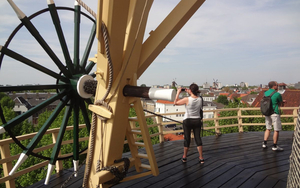IT’S not just The Beatles who pull the millions in. Or Tate Liverpool who are bringing home the Bacon (the Francis sort) with their major retrospective later this year.
Following this week's report on the economic impact of the Fab Four on Liverpool, Liverpool Biennial is keen to get in the frame and let us know that contemporary culture is also where the cash is.
The Based on independent 2014 figures, the city can look forward to an economic impact of more than £21 million when the art fest returns to the city for three months this summer.
The Biennial, which runs from July to October, takes place in galleries, unused buildings and public spaces across Liverpool with more than 40 international artists taking part.
It says it attracted 875,000 visits in 2014, over half from outside the Liverpool city region.
This time it predicts overnight visitors will spend around £11 million through accommodation, dining out and visits to other attractions.
Day trippers, which include high-spend groups such as families and the odd chara, could boost this figure to the tune of around £4 million, it adds.
Not to mention howevermany £3 skinny lattes are downed by the army of art curators and London critics who, on preview day, are in and back out of Lime Street Station faster than the Luftwaffe in the Blitz.
"Since its first instalment in 1999, Liverpool Biennial, including its partner venues, has consistently provided a strong economic boost to the city alongside the impact it has had on the city’s reputation for culture," it says here.
Following the 2014 Biennial, an independent report calculated that an economic impact of £20.8 million was generated by the festival in its 15 weeks. This is as part of an overall figure of £119.6 million in the last 10 years.
Sally Tallant, Liverpool Biennial supremo, said: “The importance of culture in the city is well documented, but I think sometimes culture’s economic impact on the city and its businesses can be forgotten about.
Liverpool Biennial welcomes visitors from around the world who come specifically to see the Biennial and stay in Liverpool. While the Biennial itself is free, the visitors have a significant, tangible impact for hotels, restaurants and bars. This is before even considering the longer-term benefits that come from the city’s growing reputation for culture.”













